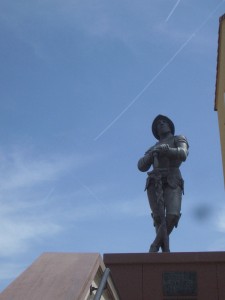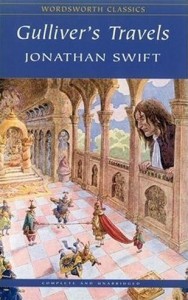
I always say I’m more into the classics, but I could be more precise. Most of my readings come from a relatively short stretch of about seventy years, from the last third of the 19th century until the mid-20th. I rarely venture further back in time, out of fear to feel overcome by the socio-cultural -or merely linguistic- distance. Thus, for example, I loved Shakespeare when I read him in college, but I indefinitely procastrinate reading more of his plays. The oldest thing I’ve ever read must have been “Lysistrata“, which felt a little slow but still makes me laugh every time I remember some lines from its chastity oath:
I’ll never lie and stare up at the ceiling,
Nor like a lion on all fours go kneeling.from the Gutenberg Project edition
One of my favourite bloggers wrote recently:
I don’t think reading classics is so important. After all, if they were read in their time is because they knew no better. I read for fun. I don’t read to cultivate myself, or to become a better person, or to have conversation topics at hipster gatherings. I read for fun. That means my choice of reading material is determined by one basic factor -that they entertain me.
Well let me entertain you all with my disagreeing thoughts. Firstly, not everything that was read in the past has reached us today. Probably loads of lesser texts (or then-considered lesser) got lost along the way by lack of interest and -therefore- copies. Even with a bit of bad luck we might have lost some of the best ones, due to their audacity or rebeliousness, in bonfires across the centuries, be it in the depths of a medieval monastery, during witch hunts or at a nazi demonstration. Following our example, less than a fourth of the plays by Aristophanes survive today. The classics that we have are not all that there was. It’s just all that we have.
Secondly, I also disagree because classics can be entertaining in many ways. They come from differents times and cultures, so dumping them all in the same basket can be quite a mistake. I find most classics amusing for some reason or other. Sometimes you discover how old is a certain idea (a character in “The Clouds” already offends somebody else by showing him the finger, over 400 years before Christ), or how early a cliché was born that we still see as modern nowadays, from criticism to the monarchy to vampire myths. In other ocassions one discovers the meaning that certain words used to have and, by seeing them used in a different context, one can deduce how they came to evolve into their modern meaning. Quite often, in general, one can see how people lived in former times, as if you were watching a transdimensional edition of “Big Brother“.
 Aditionally, as writers, we owe a certain commitment to the literary tradition. For example, the novel that I’m working on describes a whole new universe, so for “documentation” purposes I enlarged my queue of readings with titles such as “Alice in Wonderland” or “Gulliver’s Travels”. The latter felt a little imposing because it was published as early as 1726 and I feared it wouldn’t have much to tell me. I’m finally reading it these days, and I have to say I’m impressed at the wide range of topics it touches upon. I happen to have a near-completed play whose characters have different sizes (imagine an Andalusian “Honey, I shrunk the kids“) and I have no joke in it that Jonathan Swift hasn’t already covered in his “travels” to Lilliput and Brobdingang. Moreover, his criticism of Western forms of government is just as valid today as it was almost three centuries ago.
Aditionally, as writers, we owe a certain commitment to the literary tradition. For example, the novel that I’m working on describes a whole new universe, so for “documentation” purposes I enlarged my queue of readings with titles such as “Alice in Wonderland” or “Gulliver’s Travels”. The latter felt a little imposing because it was published as early as 1726 and I feared it wouldn’t have much to tell me. I’m finally reading it these days, and I have to say I’m impressed at the wide range of topics it touches upon. I happen to have a near-completed play whose characters have different sizes (imagine an Andalusian “Honey, I shrunk the kids“) and I have no joke in it that Jonathan Swift hasn’t already covered in his “travels” to Lilliput and Brobdingang. Moreover, his criticism of Western forms of government is just as valid today as it was almost three centuries ago.
In a word, I plan to widen my range of readings, which I hope will widen both my understanding of the world and the number of ways in which literature can amuse me. Are you willing to give it a try?
Yo también me apunto a tu lista. Leí algún clásico de Grecia y Roma, pero hace mucho tiempo. Cuando era más joven devoré en un verano una colección que mis padres tenían en casa, entre aquellos volúmenes estaban: “El extraño caso del doctor Jekill y Mr Hyde”, “La isla del tesoro”, “Tom Swayer”, “El hombre invisible”… Actualmente casi todo lo que leo son autores contemporáneos en lengua española. Creo que ya los he citado en este blog, algunos de ellos son: Antonio Soler, Muñoz Molina, Etxebarria, Juan Madrid, Marsé, Millás, Saccomanno, Sepulveda, Echenique… En cuanto al comentario de una de… Leer más »
OH! Cómo piensas representar una obra con personajes de distintos tamaños???
Yo empezaría por la Odisea… de hecho, es lo que hice… Me gustó mucho, es muy ameno.
Creo que ante viajar tan atrás en el tiempo, mis próximos clásicos van a ser Cela y Conan Doyle. Si finalmente me pillo el Kindle para navidades, caerán como churros ;D
Buena pregunta, joss, ¡está todo pensado! ;D